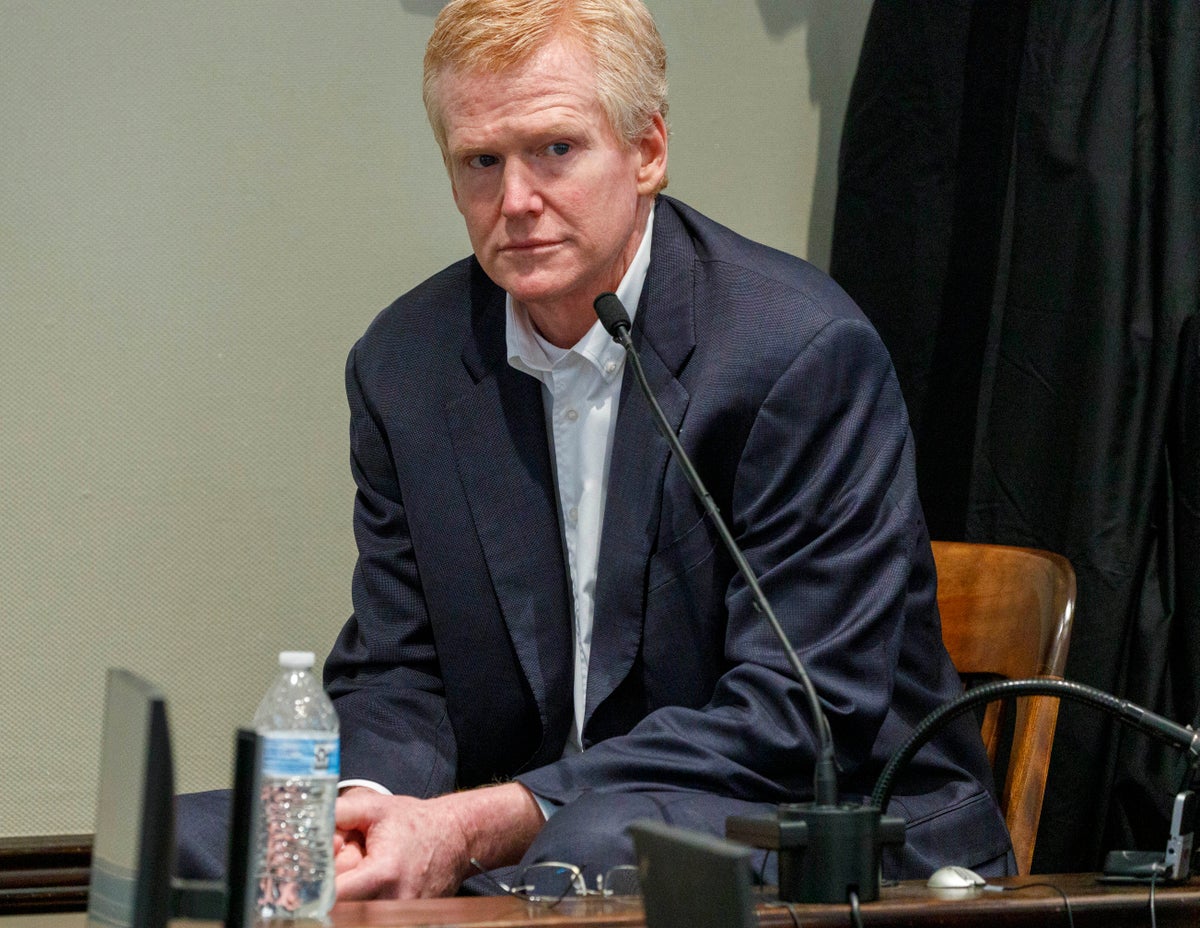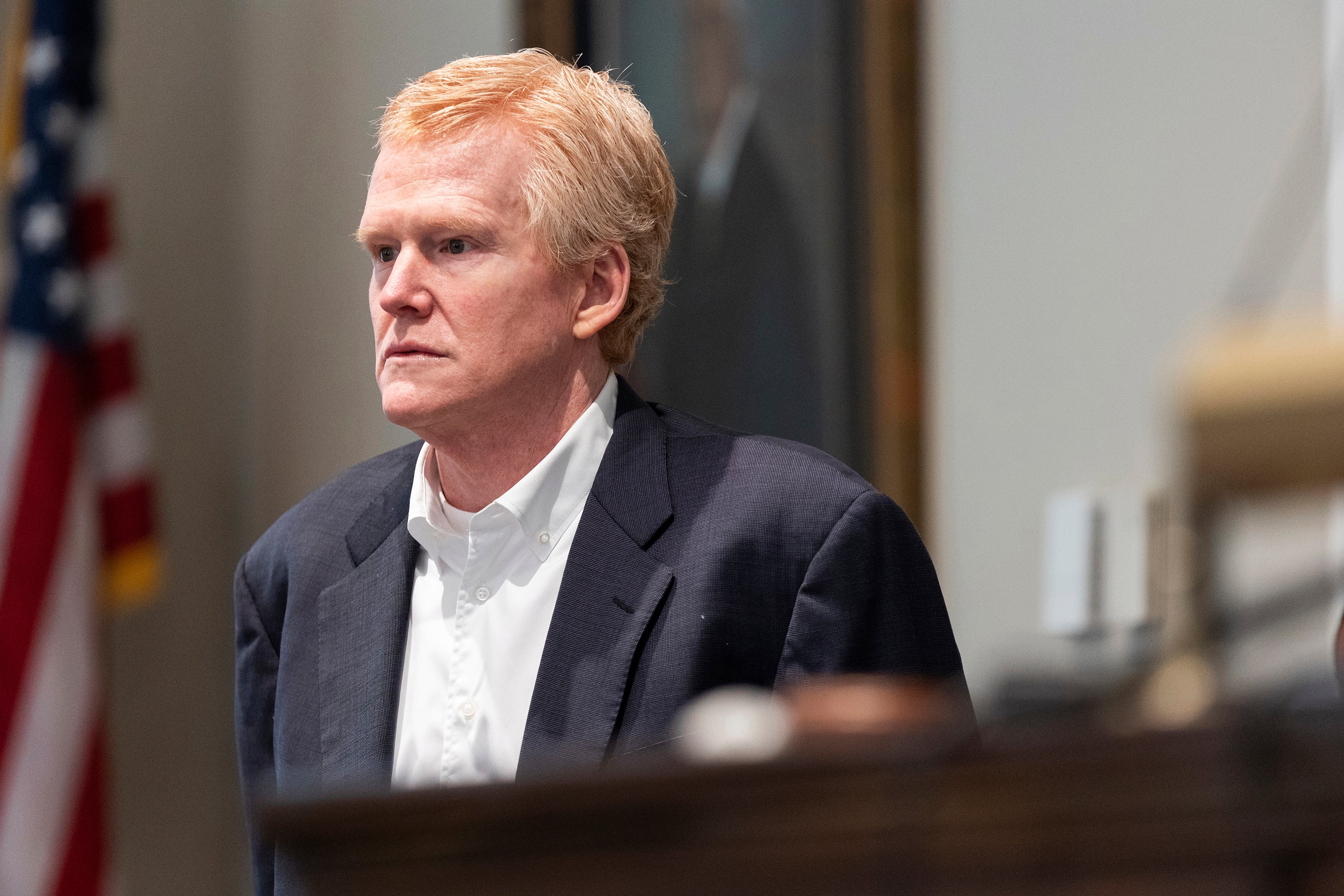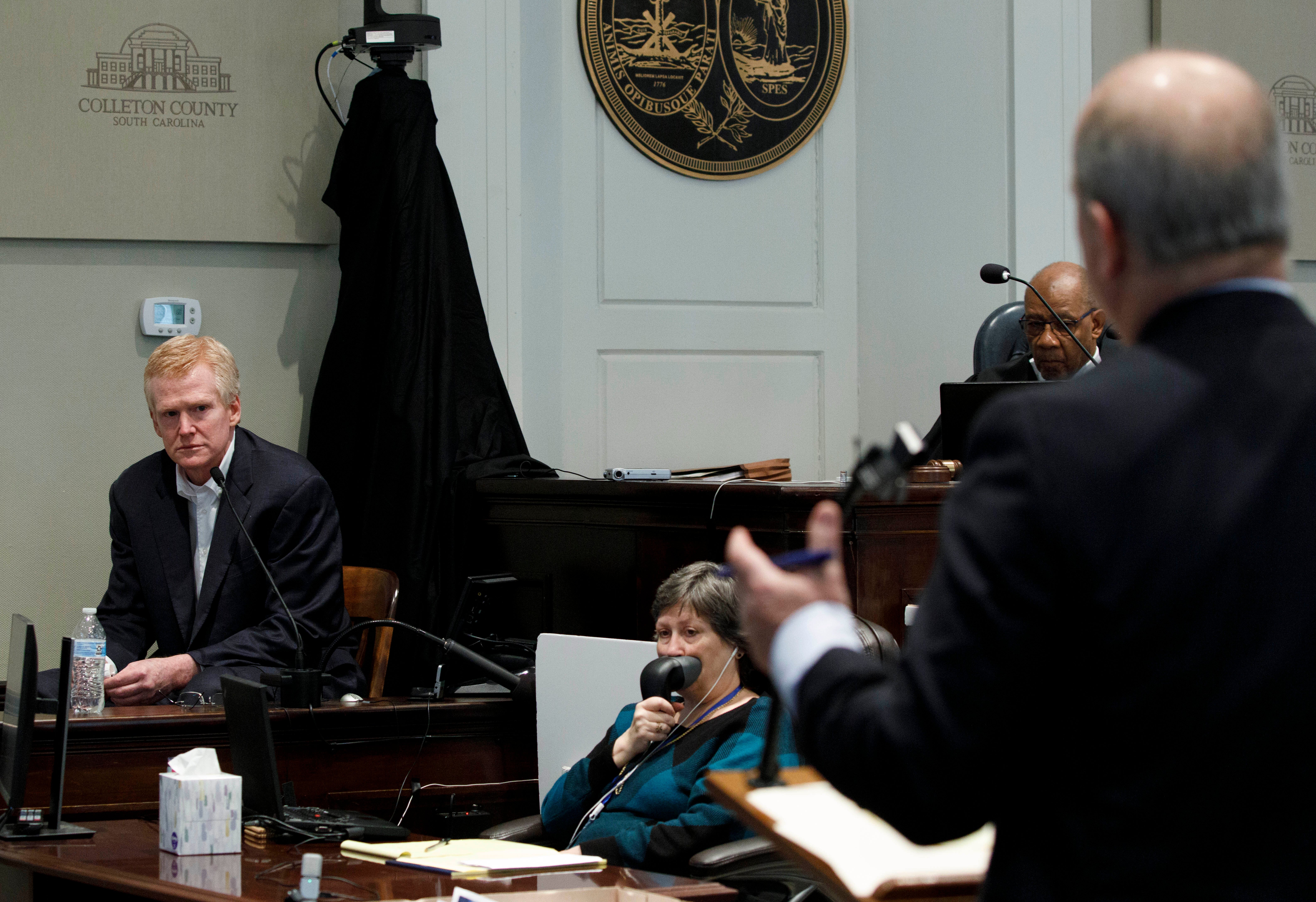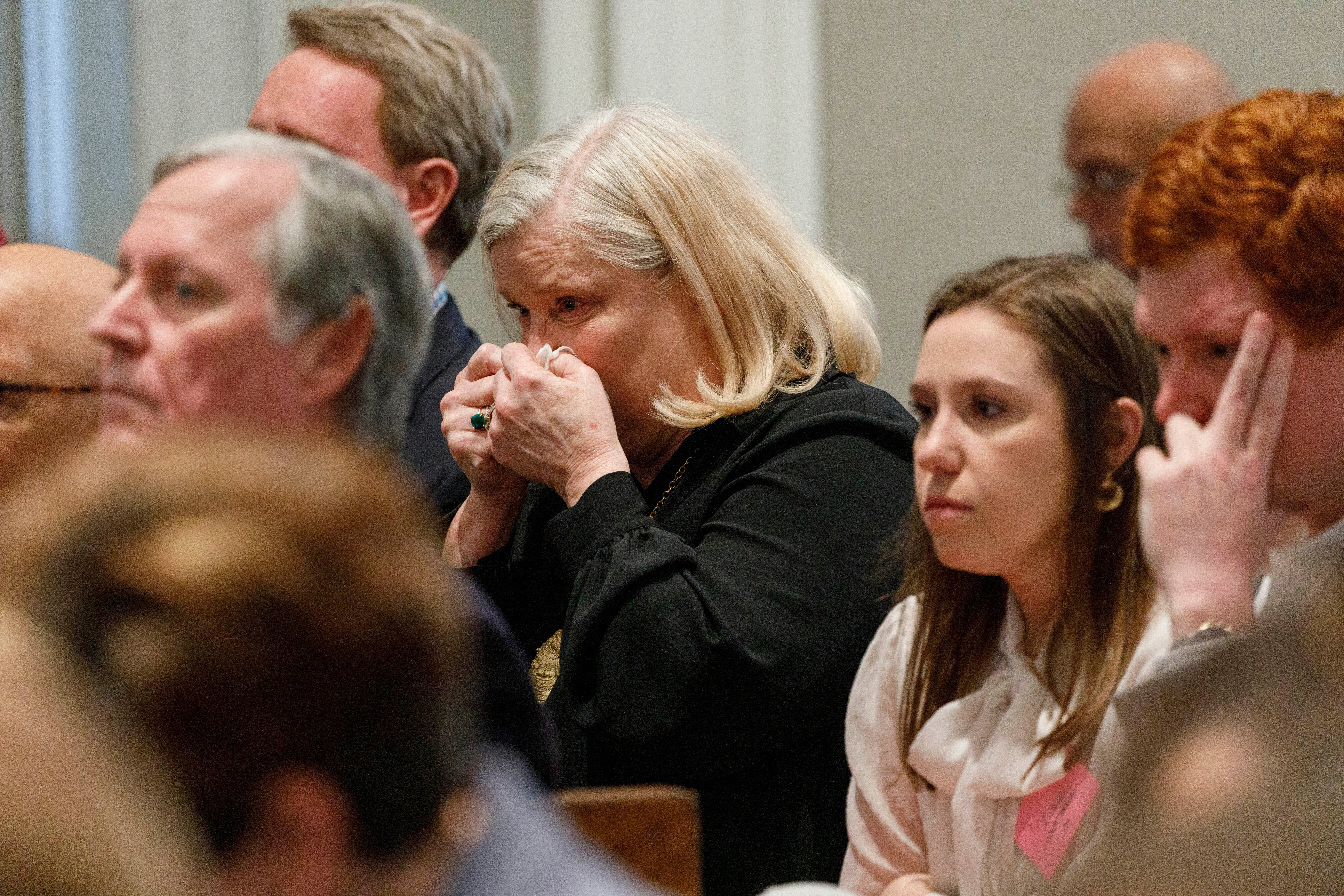
Alex Murdaugh has confessed to stealing money from his law firm and to orchestrating a bizarre botched hitman plot – but continues to deny killing his wife Maggie and son Paul in cold blood on the family’s sprawling estate.
The disgraced attorney – who is facing almost 100 charges for a multi-million-dollar financial fraud scheme – took the witness stand in his own double murder trial in the Colleton County Courthouse in Walterboro, South Carolina, on Thursday.
During dramatic testimony, Mr Murdaugh admitted that he had stolen funds from clients at his law firm PMPED.
“I did,” he said.
Mr Murdaugh blamed his alleged financial crimes on a 20-year opioid addiction, which he said he had spent years battling.
“I’m not quite sure how it got the way it got but I was battling addiction for so many years. I was spending so much money on pills,” he said.
“My addiction is to opiate painkillers in particular to oxycodone,” he said.
He claimed that he developed his addiction after injuring his knee in college, and his addiction just escalated after that.
“It just escalated and escalated and escalated,” he said.
Mr Murdaugh said that he has been to a detox facility three times over the years – the first time in December 2017 – but always relapsed.
When asked how long he had been clean of drugs, he smiled at the jury and said: “535 days and “I’m very proud of that.”
In a move that sought to undermine the prosecution’s theory of a motive, Mr Murdaugh insisted that he was not concerned that his financial crimes were on the brink of exposure on 7 June 2021 – the day of the murders.
Prosecutors claim that Mr Murdaugh killed his wife and son to distract from his string of alleged financial crimes – at a time when his multi-million-dollar fraud scheme was on the brink of being exposed.

His law firm was asking questions about missing payments – with his CFO confronting him about $792,000 on the day of the murders – and a hearing in the 2019 fatal boat crash lawsuit was scheduled for that week.
When asked by his attorney Jim Griffin if, on the day of the murders, he thought his “financial house of cards was crumbling”, he insisted he did not.
He sought to dismiss the significance of a voicemail message he sent to former Palmetto State Bank CEO Russell Laffitte four days before the murders – and suggested that the deaths of Maggie and Paul could not have benefited him financially,
On 3 June 2021, Mr Murdaugh sent a voicemail to Mr Laffitte asking him for money to extend credit on the family Moselle home.
“I need to extend farm credit line another 600k. My dad will sign also if needed. How much turnaround will that take?” he asked.
Mr Murdaugh insisted that there was $7m equity in Moselle home and that the home was fully in Maggie’s name.
“The entire Moselle property was 100 percent in Maggie’s name,” he said, so her death actually made it more difficult to access his finances.
The second home – the Edisto Beach house – was owned 50-50 by the married couple so he also couldn’t access the equity after her death, he said.
Mr Murdaugh also said that there was no life insurance policies on Maggie and Paul.
Jurors have previously heard troves of testimony from Mr Murdaugh’s former law firm colleagues, fellow lawyers and legal clients about his alleged financial crimes.
Jeanne Seckinger, the CFO at PMPED, previously testifed that she had confronted Mr Murdaugh over missing payments on the day of Maggie and Paul’s murders.
She told the court that by 7 June 2021 the law firm partners had noticed $792,000 worth of legal fees missing from the case he worked with attorney Chris Wilson.
When she approached Mr Murdaugh to ask him about it that morning she said he appeared to be “disgusted” with her.
Hours later, Maggie and Paul were shot dead.
Ms Seckinger – and other PMPED partners – testified that their deaths put the probe into the missing payments on hold as they were focused on rallying around Mr Murdaugh.
Mr Murdaugh testified that he was not overly concerned by Ms Seckinger confronting him about the money that day.
“I had some level of concern asking me about money that I took that I wasn’t supposed to have,” he said.
“But not that concerned.”

He also downplayed the significant of the boat crash hearing saying he was concerned about a change in venue – but not that his finances would be exposed through the suit.
At the time of the murders, Mr Murdaugh was being sued by the family of Mallory Beach – a 19-year-old woman who died in a 2019 crash in the Murdaugh family boat.
Paul was allegedly drunk driving the boat at the time and crashed it, throwing Beach overboard. Her body washed ashore a week later. Paul was charged with multiple felonies over the boat wreck and was facing 25 years in prison at the time of his murder.
The Beach family sued Mr Murdaugh and a lawsuit hearing was scheduled for 10 June 2021.
Their attorney had also filed a motion to compel, which prosecutors say would have exposed Mr Murdaugh’s ruinous finances.
The hearing was then postponed following Maggie and Paul’s murders.
Mr Murdaugh dismissed the significance of the hearing, saying that, based on his own legal experience, the motion to compel was not so significant.
Over the coming months after the murders, Mr Murdaugh’s law firm partners uncovered an alleged multi-million-dollar fraud scheme where he had stolen millions from their clients and pocketed it himself.
Things reaching a head on 3 September when the partners confronted him about the scheme and forced him to resign.
The next day, Mr Murdaugh was shot in the head in what turned out to be a botched hitman plot.
Mr Murdaugh told the court that he initially asked his alleged accomplice Curtis EddieSmith “to bring me pills” but then “changed the plan”.
“Not to get pills anymore. I asked him to shoot me,” he said.
Mr Murdaugh said he believed it would be better for him to be dead.
“I meant for him to shoot me so I’d be gone,” he said.
“I knew all this was coming to a head. I knew how humiliating it would be for my son... I’d been through so much.
“At the time... I thought it was the better thing to do.”
After the shooting, Mr Murdaugh initially claimed he was the victim of a drive-by shooting while he changed a tire by the side of a road in Hampton County.
He spent hours with a sketch artist to help track down the fictional drive-by shooter.
But, Mr Murdaugh’s story about the incident quickly unravelled.

One week later on 13 September, he confessed to law enforcement that he had orchestrated the whole saga, paying an alleged hitman to shoot and kill him in an assisted suicide plot so that his surviving son Buster could get a $12m life insurance windfall.
He told investigators that he asked Mr Smith – a former law firm client, distant cousin and allegedly his drug dealer – to carry out the shooting. Both he and Mr Smith were arrested and are awaiting trial over the incident.
Mr Murdaugh’s confession to the two other cases he is awaiting trial for – the financial crimes and the botched hitman plot – appears to be part of the defence’s strategy to suggest that the disgraced attorney would also confess to the murders if he was guilty of carrying out them too.
But, it comes after jurors have heard four weeks of dramatic testimony from the prosecution, presenting Mr Murdaugh as a serial liar who has orchestrated situations to paint himself as a victim when his alleged crimes were on the brink of exposure.
In total, 61 prosecution witnesses covered a trove of circumstantial evidence, including cellphone and car data, a damning video allegedly placing Mr Murdaugh at the crime scene and apparent holes in his alibi for the time for the murders.
Mr Murdaugh, 54, is facing life in prison for the murders of his wife and son. He has pleaded not guilty.







